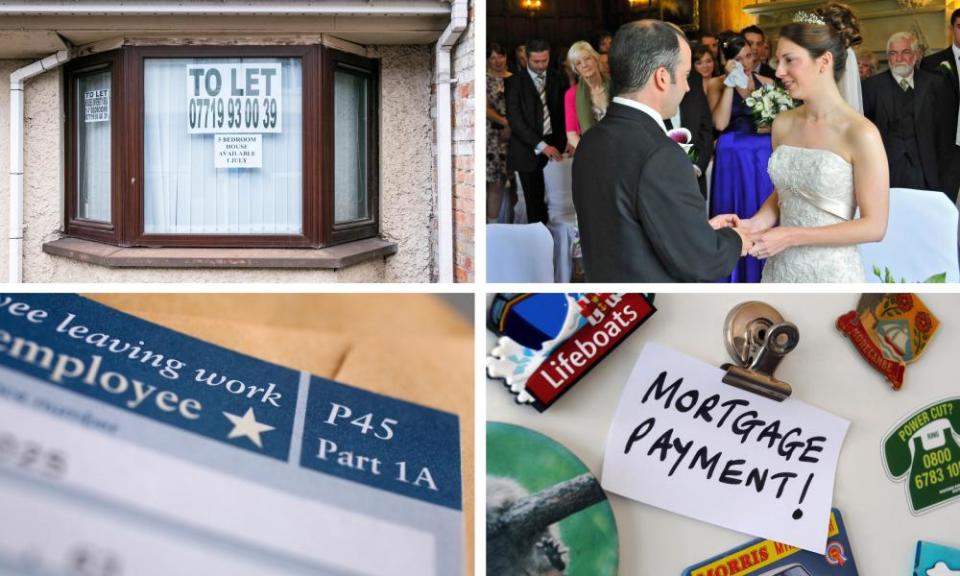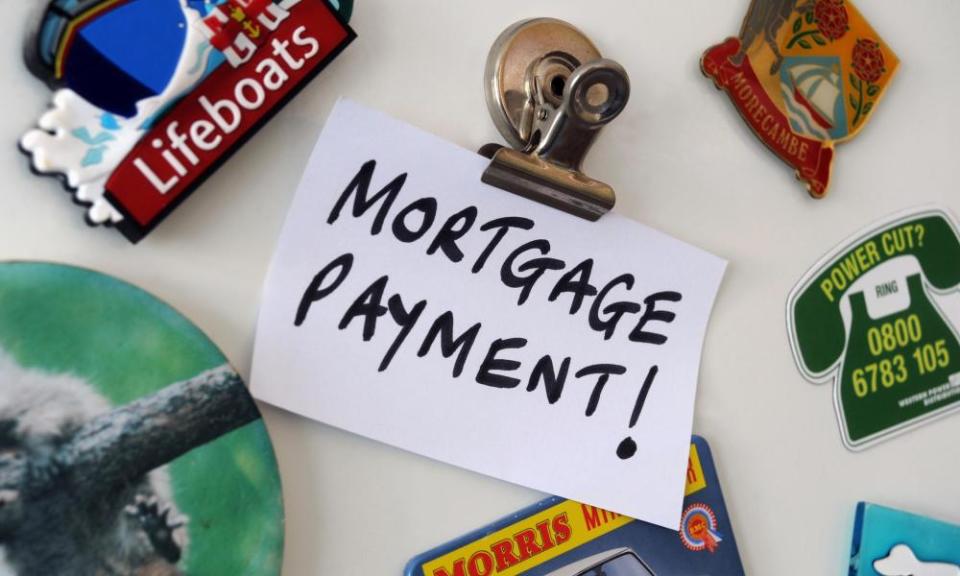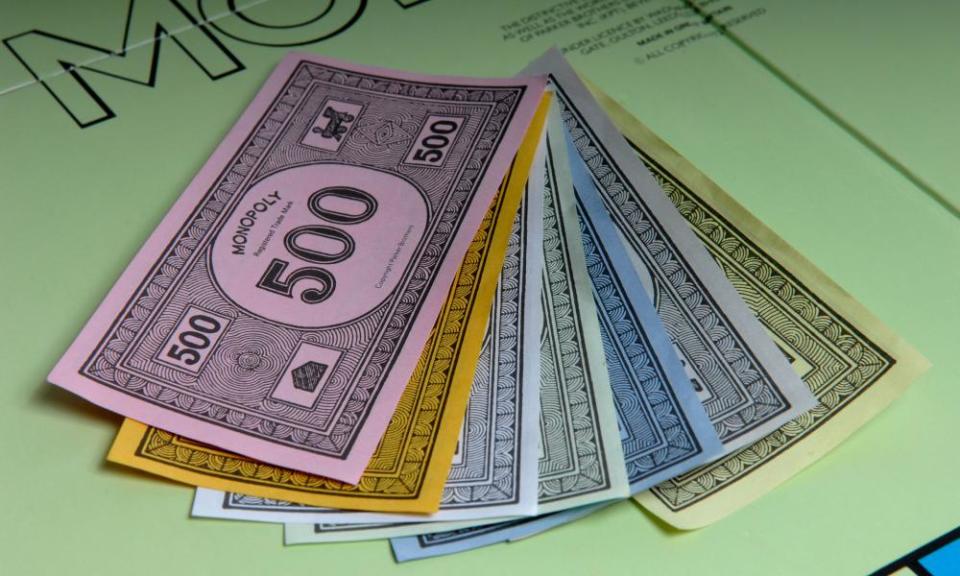Coronavirus: what your insurance may (and may not) cover

You can’t work because of illness. Or your wedding has to be cancelled. Or you’ve been made redundant and can’t pay the mortgage. Or your tenant has stopped paying the rent. These and hundreds of other situations are often covered by insurance contracts. But as coronavirus sweeps the world, will the insurers pay out?
Until now the focus has been on travel insurance, but as the economic impact of the virus is taking hold, other types of insurance come into play. We examine what you might have, what you might get, and what you won’t.
Wedding insurance

What is it?
These policies are designed to pay out if the couple have to cancel or rearrange their wedding due to unforeseen circumstances. Given that spring and early summer are the peak season for weddings, there will be a lot of people wanting to claim if they took out a policy. Big providers include John Lewis and Debenhams, and specialist including Emerald Life.
Will it pay out for coronavirus?
Couples who wanted to get married are now being tied in knots by the wording in these insurance policies. For example, the John Lewis policy says explicitly it will pay out for cancellation caused by “the booked venue for the wedding or wedding reception being unable to hold your wedding due to an outbreak of infectious or contagious disease”.
A lot of couples will think, great, surely we will get a payout. But it’s not that simple – and distraught couples are finding their claims are being rejected.
Why? Because weddings have not been banned by the government. If the wedding venue itself does not cancel the event the John Lewis policy will not pay out.
John Lewis says: “The current UK government position is that … weddings are still permitted to take place. So if your wedding venue is still prepared to hold your wedding and you chose to cancel, then this would not be covered.”
John Lewis also warns couples against cancelling without minimising losses – for example, asking suppliers such as venues, cake makers, photographers etc, to give refunds, or to rebook at a later date. “We may ask you to provide copies of your venue and supplier contracts as well as relevant correspondence with them, and may refuse cover in the event that we consider that you have not adequately minimised your costs.”
John Lewis will pay out if a person central to the wedding – bride, bridegroom, very close family etc – has contracted coronavirus. But if a key person is self-isolating without an actual diagnosis it won’t pay out.
The company has, inevitably, stopped selling wedding insurance, and its treatment of customers during this period will no doubt be noted by other couples arranging their nuptials in future.
Emerald Life kept selling wedding insurance until 18 March, although only for weddings taking place in or after October, but it has also now closed its doors. It said: “What we are doing is talking through whether customers can rearrange as a practical measure. Most venues and suppliers seem to want to help, and we will then just move their wedding date forward and extend the wedding coverage at no extra charge.”
Income protection cover

What is it?
The insurers promise that an income protection policy will give you a monthly income if you can’t work because you are ill or injured, and in some cases if you are made unemployed. It pays a proportion of your lost earnings (usually around two-thirds of your former salary), with the payments continuing until you return to paid work or you retire.
Policies are sold with “waiting periods”. The more expensive ones let you claim the moment you can’t work, while the cheaper (and more widely sold) don’t pay out until after a month or so. The typical monthly cost is about £60 to £80.
Will it pay out for coronavirus?
When we contacted LV=, one of the UK’s biggest providers, it said it had yet to receive a coronavirus-related claim. But it added that it would stand by the policies and pay claims as they arise.
It said: “While coronavirus is an unprecedented global pandemic, we recognise that it is already changing lives of everyday individuals and families. Income protection insurance has, and will have, a role to play, offering valuable reassurance and a much-needed financial safety net.”
For a confirmed diagnosis of coronavirus, LV= said: “We’ll assess and pay their claim in the usual way, reflecting their chosen waiting period and the policy terms and conditions.”
But what if you have not been given a diagnosis, but have to stop working and self-isolate? If you are self-employed, that means you immediately lose income. Can you claim?
LV= said that for its Personal Sick Pay plan holders with a day-zero and week-one waiting period, it would consider claims for medically advised self isolation. It adds: “These are highly unusual circumstances, so any decision and payment we make for self isolation will be outside of the normal terms and conditions. … We’ll make decisions immediately and any payments we make for self-isolation (current guidance is for up to 14 days from contact) will be in our member’s bank account within a couple of days.” LV= policies do not include cover for unemployment.
It said it is still selling the policies, but that is under constant review.
When we put the same questions to Aviva, another major provider of income protection policies, its response was a bit tougher.
Aviva confirmed that customers with coronavirus who are unable to work past the waiting period will receive payouts according to the policy terms.
But it added that its policies did not cover any other reasons why customers couldn’t carry out their occupation, such as employer or government restrictions around self isolation, though it added it would look at “each case individually to determine the best outcome for their circumstances”.
Rental guarantee insurance

What is it
Direct Line is a big seller of landlord insurance, and offers an add-on called rent guarantee insurance. As the Direct Line marketing says: “We’ll provide cover for any unpaid rent if you have to repossess your property. If your tenants can’t pay, we will.”
Claims can be made once the rent has been overdue for at least one month, and landlords can claim as much as £250,000.
Will it pay out for coronavirus?
This is going to be a very interesting one. Currently, Direct Line says: “Once the tenant has not paid rent for 30 days and the relevant section 21 or section 8 notice has been issued, then you can claim.”
A section 21 notice is the standard eviction notice used by landlords. But on 18 March the government banned all evictions. So it puts landlords in a catch-22. They have insurance that will pay out if a tenant defaults, but can only claim if they evict the tenant, and that is now banned for the moment.
Direct Line said: “The situation with coronavirus is unprecedented, and the actions of the landlord will vary depending on the circumstances they are faced with and those facing the tenant. Just because a landlord has rent guarantee cover doesn’t mean that they will call upon the policy to make a claim in every circumstance.”
It said the landlord might decide to accept a revised payment schedule, and that a tenant who has lost their job might be able to claim universal credit. But it confirmed that the landlord can only make a claim on the rent guarantee if the eviction notice “has been correctly served on the tenant”.

 Yahoo Finance
Yahoo Finance 